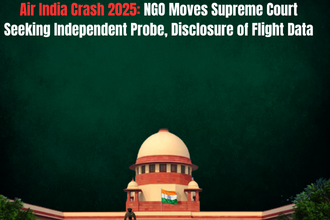In a significant and unprecedented move in the Indian judiciary, Chief Justice of India (CJI) Sanjiv Khanna has submitted the inquiry report concerning allegations against Justice Yashwant Varma to the President and Prime Minister of India. The report, prepared by a three-member in-house committee, investigates the circumstances surrounding the discovery of unaccounted cash at the residence of the sitting judge and marks a crucial development in judicial accountability and transparency.
Background of the Allegations
The controversy began on the evening of March 14, 2025, when a fire broke out at Justice Yashwant Varma’s residence in Delhi. At the time, Justice Varma and his wife were not present in the city and were reportedly traveling in Madhya Pradesh. Only his aged mother and daughter were at home during the incident. Following the fire, firefighters allegedly discovered bundles of unaccounted cash at the site. A video that later surfaced showed the cash burning in the flames, intensifying suspicions and allegations of corruption.
The video, shared by the Delhi Police Commissioner, reached the Chief Justice of the Delhi High Court and was later made public by the Supreme Court of India, along with a preliminary report and Justice Varma’s official response—a rare step that underlines the gravity of the situation.
The In-House Committee and Its Findings
In response to the explosive allegations, CJI Sanjiv Khanna constituted an in-house committee on March 22, 2025, under the standard In-House Procedure used for investigating misconduct involving judges. The three-member committee included:
- Chief Justice Sheel Nagu (Punjab and Haryana High Court)
- Chief Justice GS Sandhawalia (Himachal Pradesh High Court)
- Justice Anu Sivaraman (Karnataka High Court)
The panel began its probe on March 25 and submitted its final report to the CJI on May 4, 2025. The report was dated May 3, 2025, and has since been forwarded to President Droupadi Murmu and Prime Minister Narendra Modi. Justice Varma’s detailed response, dated May 6, 2025, was also enclosed with the report.
Reportedly Indicted, Justice Varma Asked to Resign
According to sources cited by Bar & Bench, the in-house committee has reportedly indicted Justice Yashwant Varma. Following the committee’s conclusions, CJI Khanna is believed to have asked the judge to either resign or face impeachment proceedings. Such a recommendation is significant and signals a strict stance on judicial integrity, especially in an environment where public trust in the judiciary is paramount.
Transfer and Suspension of Judicial Work
Amid growing concerns, the Supreme Court directed Justice Varma to be repatriated to his parent High Court—the Allahabad High Court. There, he recently took an oath of office. However, on the instructions of the CJI, his judicial responsibilities have been suspended, effectively removing him from any ongoing adjudicatory role.
This administrative action triggered strong reactions, including a strike by the Allahabad High Court Bar Association, protesting the judge’s repatriation and raising concerns about institutional accountability and due process.
Legal Advice and Support Team
In anticipation of legal proceedings and in defense of his position, Justice Varma reportedly sought the advice of a team of senior legal experts. Among those who visited his residence were:
- Senior Advocate Siddharth Agarwal
- Senior Advocate Arundhati Katju
- Advocates Tara Narula, Stuti Gujral, and another unnamed counsel
This step underscores the seriousness of the legal and reputational ramifications for a sitting High Court judge facing such grave allegations.
No FIR Amid Ongoing Probe
The Supreme Court, on the judicial side, has refused to entertain a public interest litigation (PIL) seeking the registration of a First Information Report (FIR) against Justice Varma, citing the ongoing in-house inquiry. The Court’s decision to maintain procedural discipline reflects its commitment to allowing internal mechanisms to function independently before inviting criminal investigation agencies into the fray.
A Conspiracy or Genuine Case?
Justice Varma has denied all allegations and maintains that the incident may be part of a larger conspiracy to frame him. The origins of the fire, the source of the cash, and the motivation behind leaking the video remain subjects of speculation. His response to the committee reportedly outlines these concerns and provides an alternate narrative to the one being projected in the public domain.
Significance of CJI’s Forwarding to President and PM
By forwarding the report and response to the President and Prime Minister, CJI Khanna has triggered the next steps under Article 124(4) of the Constitution, which deals with the removal of judges. If the government deems it necessary, parliamentary impeachment proceedings could be initiated.
This rare instance showcases the institutional resolve to preserve judicial accountability without compromising the independence of the judiciary. The process also follows the protocol laid out in the “In-House Procedure”, a framework that was developed after the 1999 Judges Inquiry Bill failed to pass in Parliament.
Conclusion: A Watershed Moment for Judicial Ethics in India
The Justice Yashwant Varma case represents a watershed moment in the evolving landscape of judicial ethics in India. It is not merely an investigation into one judge’s conduct, but a test of the judiciary’s internal checks and balances. With the CJI taking an assertive and transparent approach, and the highest constitutional offices now involved, the outcome of this case could set a precedent for handling similar cases in the future.
For the public, legal fraternity, and the judiciary, this case will be watched closely—not just for its outcome, but for what it signals about the strength and integrity of Indian democratic institutions.


